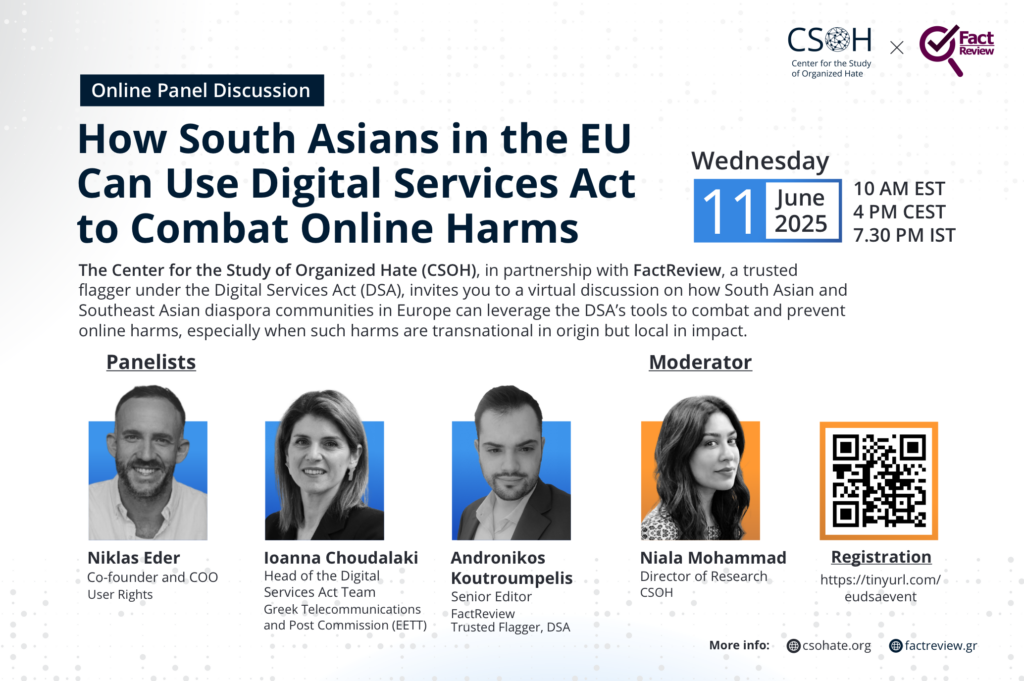The European Union’s Digital Services Act (DSA), fully in force since February 2024, provides powerful new mechanisms for users across Europe to hold digital platforms accountable for illegal and harmful content. The DSA requires platforms to implement clear notice-and-action systems, increase transparency around content moderation, and cooperate with trusted flaggers and civil society groups.
Yet, awareness of these rights remains alarmingly low, especially among the communities most impacted by online hate: racial, ethnic, religious, caste, and sexual minorities. For the millions of South Asians and Southeast Asians living in Europe, online harms often come not only from local sources but also from their countries of origin.
Despite being disproportionately affected, many in the diaspora are unaware that they can submit complaints, challenge platform inaction, or escalate cases to national Digital Services Coordinators under the DSA. This lack of awareness leaves communities vulnerable and underrepresented in regulatory processes meant to protect them.
The Center for the Study of Organized Hate (CSOH), in partnership with FactReview, a trusted flagger under the DSA, invites you to a virtual discussion on how South Asian and Southeast Asian diaspora communities in Europe can leverage the DSA’s tools to combat and prevent online harms, especially when such harms are transnational in origin but local in impact.
Panelists
Niklas Eder
Niklas Eder (LL.M. and Maître en Droit) is co-founder and COO of User Rights. He is also a visiting lecturer at King’s College London, where he teaches the course “Technology, Democracy and Society”. Previously, he worked as a Senior Policy Officer at the Oversight Board and as a Postdoctoral Fellow at the Centre for Socio-Legal Studies at the University of Oxford. Niklas was also a Fellow at the Information Society Project at Yale Law School and a Visiting Scholar at Columbia University. He holds a PhD in European constitutional law and legal philosophy. Earlier in his career, he worked at the Free University Berlin, Humboldt University Berlin, and in the German Parliament.
Ioanna Choudalaki
Ioanna Choudalaki is the head of the Digital Services Act Team at the Greek Telecommunications and Post Commission (EETT). She is also the head of the newly established Directorate for Digital Services. Since January 2016, she has been a drafter in the Body of European Regulators for Electronic Communications (BEREC) Roaming Working Group (WG), where she supported the implementation of Roam Like At Home, and in December 2018, she was appointed Co-Chair of this WG. In 2023 Ioanna was also a part of the BEREC Chair team – she was the Chair of the BEREC Contact Network.
Andronikos Koutroumpelis
Andronikos Koutroumpelis has been active in fact-checking networks since 2018. In 2019, he was involved in launching Meta’s fact-checking program in Greece. In 2024, his organization FactReview became the first entity in Greece to be officially recognized as a Trusted Flagger under the Digital Services Act (DSA). Andronikos works across cross-national programs focusing on fact-checking investigations, media and AI literacy, technological tools, and DSA oversight.
Moderator
Niala Mohammad
Niala Mohammad serves as the Director of Research at the Center for the Study of Organized Hate (CSOH). Previously, she served as a Senior Policy Analyst for South Asia at the U.S. Commission on International Religious Freedom (USCIRF). Before this role, she served 14-plus years as a multimedia broadcast journalist with the Voice of America covering South Asia.
